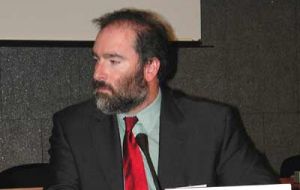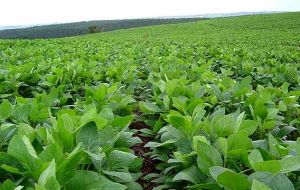MercoPress. South Atlantic News Agency
Paraguay's Destructive Soy Boom
 Jeremy Hobbs is executive director of Oxfam International
Jeremy Hobbs is executive director of Oxfam International By Jeremy Hobbs - The following column was published in The New York Times Opinion page.
It gives another side of the current situation in Paraguay, and the role the landlocked country plays as a leading exporter of the oilseed.
Fernando Lugo is the latest victim of Paraguay’s “soy war.” Elected president in 2008 as a “champion of the poor,” Lugo was impeached late last month, plunging this poorest of South American countries into uncertainty.
Lugo’s election on a promise to redistribute land and carry out agrarian reform was popular but ultimately unachievable because of the interests ranged against him. Earlier in June, 11 campesinos and 6 police officers were killed during an operation to evict squatters from a huge farm used by a large-scale land owner and opponent of Lugo. Using this as pretence, the Senate impeached Lugo a week later.
But it’s the rise of the humble soy plant — and the oceans of land upon which it grows in Paraguay — that links Lugo’s ouster in a historical struggle between the country’s powerful landed elite and its poverty-stricken farmers, on the one hand, and a world that has no apparent limit to its appetite for soy-fed animal meat and bio-fuels, on the other.
Paraguay is not the first country to lose a government over land disputes. It will not be the last. After decades of cronyism and corruption, 77% of Paraguay’s arable land is owned by just 2% of the population. Globally in the past 10 years, deals have been struck for 203 million hectares of land — nearly six times the size of Germany — at a pace and scale that is outstripping the ability of governance structures to respond. The cracks, as in Paraguay, are never far from the surface.
Paraguay is now the world’s fourth-largest exporter of soy and demand is surging, driven primarily by China and Europe for cattle feed and bio-fuels. Paraguay’s agricultural landscape has altered dramatically on the back of this boom. Since 1996, more than 1.2 million hectares of forest have been cut down to grow soy rather than food and other crops. Brazilian settlers — the brasiguayos — have set up large-scale soy farms, provoking a prolonged conflict over what locals say is “earth robbery.” Over the last 20 years 100,000 small-scale local farmers have migrated to city slums or to other countries or have become landless. Each year in Paraguay 9,000 rural families are evicted by soy production and nearly half a million hectares of land are turned into soy fields.
Ironically, in a country where 40% of the population still lives in poverty and 11% are undernourished, Paraguay’s macro-economy is booming. Its G.D.P. grew by 15% in 2010 — the second-fastest-growing economy in the world — on the back of soy exports worth 1.6 billion dollars.
The Paraguay soy boom — made in China and Europe and grown upon the lands of the political elite — is controlled by the boardrooms of Big Business. As much as 70% of Paraguay’s soy is exported each year and of that the multinational grain giants Cargill, ADM and Bunge account for about 70%.
In 2004, the agribusiness Syngenta caused indignation by publishing an advertisement of a map that shaded a large area of Argentina, Brazil, Bolivia, Paraguay and Uruguay and called it the “United Soy Republic.”
But Paraguay has been unable to add significant value to its soy exports: In 2010, 5.7 million tons of its total harvest was exported as raw bean while only 1.5 million tons were processed. Other actors seem to be gaining more from this part of the United Soy Republic than ordinary Paraguayans are.
There is ample cause for concern about law and order and the democratic process in Paraguay. In the event of any conflict, it is always the poor who suffer most. The international community needs to give more support to the people of Paraguay in order to build a more fair and inclusive country. They must give greater focus to rural development and sustainable food production, and to more equitable land rights, so that the poorest farmers are better protected from the global demand for land.
The I.M.F. believes that Paraguay’s economy will grow next year to the tune of 8.5% — a fantastic prospect but only if the benefits of this can be fairly shared. More widely than that, corporate and political leaders who have helped to spur Paraguay’s soy boom need to look hard at its sustainability and how fairly it is returning benefits to ordinary Paraguayans.
More than half of the soy grown in Paraguay is exported to Argentina, and much of this is turned into diesel either in Argentina or in Europe to fuel Europe’s cars. In a world where a billion people go to bed hungry every night, policies that convert arable land from growing food to fuel are surely wrong-headed, and are only likely to increase competition and conflict over a scarce natural resource.





Top Comments
Disclaimer & comment rules-

-

-

Read all comments“77% of Paraguay’s arable land is owned by just 2% of the population”
Jul 05th, 2012 - 10:06 am 0A shameful situation. The reason for Paraguay's backwardness. And a situation the parliamentry coup wants to perpetuate. For which the anti-Cristinistas on here then call them “model democrats”. These right wing hypocrites make me sick
They soy tragedy extends to all countries in the “United Soy Republic”, small farmers in these countries cannot compete with large and multinational producers, Soy also represents some 25% of all Argentinian exports, and it also important for Brazil and Uruguay as well. This is a rather dangerous dependence on a single commodity, responsible leaders must steer their countries away from commodity dependence and into industrialization and manufacturing, where better jobs are created.
Jul 05th, 2012 - 12:51 pm 0Ms. Kirchner depends totally on soy production in Argentina, she has pushed this as the wonder crop.
Jul 05th, 2012 - 03:59 pm 0It has caused the displacement of thousands of indigenous people throughout the Northern provinces of Argentina, thankfully its too cold for soy in Patagonia until Cargill or Monsanto produce a GM that is cold resistent.
Commenting for this story is now closed.
If you have a Facebook account, become a fan and comment on our Facebook Page!